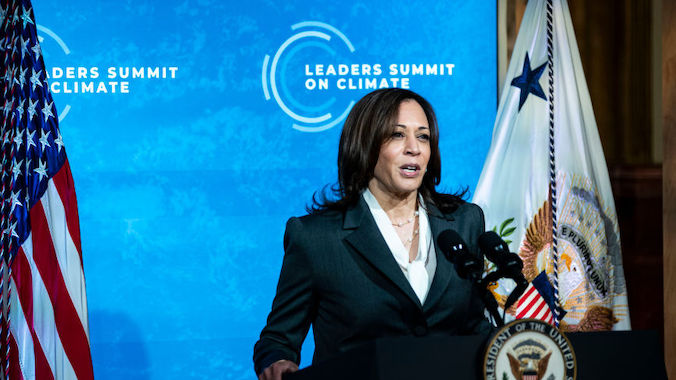What Would a Harris Presidency Mean for Climate Progress?
Photo by Al Drago-Pool/Getty Images
By any sane measure, Joe Biden has been the best climate president the U.S. has ever had. This is not, of course, a particularly high bar, but there have been a number of legitimate bright spots, from the passage of the Inflation Reduction Act and its hundreds of billions in climate-friendly funding to the championing of the nascent offshore wind industry to at least some attempts to limit drilling on public lands.
But now Biden’s done, so what’s next? With the Democrats apparently rallying around Vice President Kamala Harris as their new nominee, where would climate progress head in a Harris administration?
Based on her public statements, record as a Senator and prosecutor, and as VP, the answer seems pretty promising.
During her time as California’s attorney general in 2016, Harris led an investigation into ExxonMobil and whether the oil giant repeatedly lied to investors and the public about the effect of its products on the climate. That investigation didn’t proceed into actual lawsuits, as it did in other states, but the state did sue various other oil and pipeline companies along the way.
As a Senator, her environmental record in general is solid. The League of Conservation Voters, which maintains a scorecard for everyone in Congress based on their enviro voting record, gives her a lifetime score of 90 percent — and the only dings against here are relatively low-impact votes she missed while campaigning in 2019 and 2020. She was also an original co-sponsor of the Green New Deal in 2019, introduced by Alexandria Ocasio-Cortez in the House and Massachusetts’s Ed Markey in the Senate.
“For too long, we have been governed by lawmakers who are beholden to big oil and big coal,” she wrote in a Medium post at the time. “[W]e have a shrinking window to take drastic action to cut carbon emissions and make meaningful change to save our planet. The Green New Deal is a bold plan to drastically shift our country to 100% clean and renewable energy.”
As Vice President, she has been involved with a number of the administration’s climate-related efforts. In 2022, she went to Miami to announce more than $1 billion in funding through FEMA for climate resilience projects, and has repeatedly brought attention to the justice angles of the climate crisis. “In awarding these grants, we have prioritized projects that will protect the communities that are disproportionately impacted by the climate crisis,” she said then. “We know that the impact of the climate crisis is not felt equally across all communities.”
Last summer, she was in Baltimore to announce “the largest investment in financing for community-based climate projects in our nation’s history,” including more than $20 billion to a large network of NGOs and other organizations to help build clean energy and efficiency projects. This work continued into this year; in April, in Charlotte, Harris announced that eight non-profit banks had been chosen to administer much of that $20 billion and in turn fund tens of thousands of smaller projects.
In short, she seems to think climate is a big deal. This isn’t to say it would be perfect, of course; even Biden and his “greatest climate president ever” label have some serious black marks, like the approval of the Willow project and other continued support for oil and gas. There will be fights over tailpipe emissions rules and power plant emissions rules and more, going up against a Supreme Court more than happy to dispense with pretense and simply do what it feels like doing. But at least based on what Harris has said and done to this point, what climate progress this country has made is probably safe and, to the extent of the executive branch’s power, likely to continue under her watch.